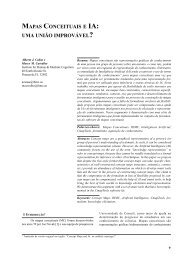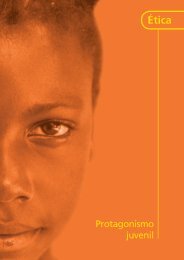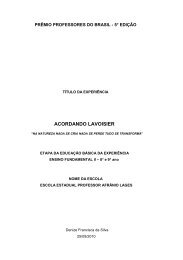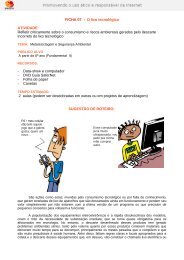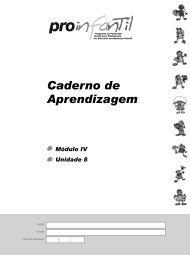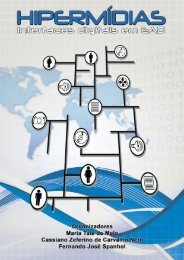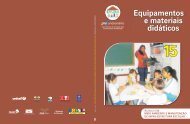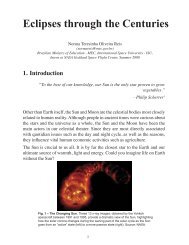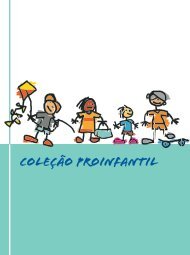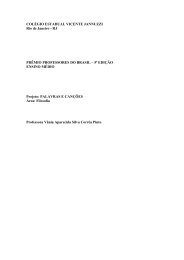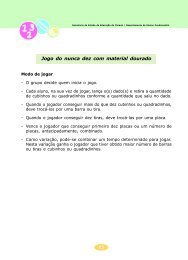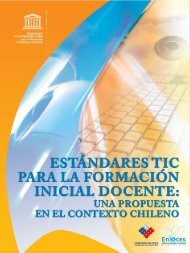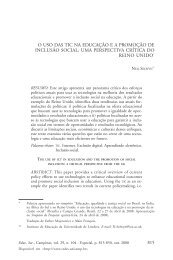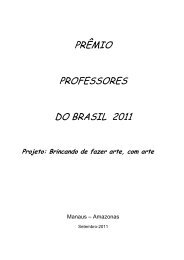BIO-CULTURAL COMMUNITY PROTOCOLS - Portal do Professor
BIO-CULTURAL COMMUNITY PROTOCOLS - Portal do Professor
BIO-CULTURAL COMMUNITY PROTOCOLS - Portal do Professor
You also want an ePaper? Increase the reach of your titles
YUMPU automatically turns print PDFs into web optimized ePapers that Google loves.
PART III / CHAPTER 7<br />
body with the authority to interpret the ICCPR – and the UN<br />
Committee on Economic, Social and Cultural Rights have<br />
held that to the extent that an indigenous group constitutes<br />
a “people,” it <strong>do</strong>es have the collective right to<br />
self-determination. 12<br />
Article 3 of the Declaration of the Rights<br />
of Indigenous Peoples (UNDRIP) reinforces this view with its<br />
assertion that “[i]ndigenous peoples have the right to selfdetermination.”<br />
13<br />
Article 3 of UNDRIP further states that by virtue of the right<br />
to self-determination, indigenous peoples “freely determine<br />
their political status and freely pursue their economic, social<br />
and cultural development,” while Article 4 adds that indigenous<br />
peoples “have a right to autonomy of self government in<br />
matters relating to internal affairs,” and Article 5 asserts that<br />
indigenous peoples have the right to maintain and strengthen<br />
their distinct political, legal, economic, social and cultural<br />
institutions.” 14 In 1984 the IV General Assembly of the World<br />
Council of Indigenous Peoples ratified the Declaration of<br />
Principles of the World Council of Indigenous Peoples, the<br />
second principle of which declares, “All Indigenous Peoples<br />
have the right to self-determination. By virtue of this right<br />
they can freely determine their political, economic, social,<br />
religious, and cultural development.” 15<br />
If the right to self-determination is going to have any<br />
significance, it must be accompanied by an expansion of<br />
States’ recognition of ILCs’ customary laws. In fact, the right<br />
of ILCs to their customary legal systems is also recognized in<br />
the system of international human rights. Article 8 of the<br />
International Labour Organization Convention No. 169<br />
concerning Indigenous and Tribal Peoples (ILO 169) specifies<br />
that in applying national laws and regulations to indigenous<br />
peoples, “due regard shall be had to their customs or customary<br />
laws.” 16 The UNDRIP expands on this with Article 34, which<br />
asserts that indigenous peoples “have the right to promote,<br />
develop and maintain their institutional structures and their<br />
distinctive customs, spirituality, traditions, procedures, practices<br />
and, in the cases where they exist, juridical systems or customs,<br />
in accordance with international human rights standards.” 17<br />
<strong>BIO</strong>-<strong>CULTURAL</strong> JURISPRUDENCE<br />
Of course, recognizing the importance of ILCs’ rights to selfdetermination<br />
and to the recognition of their customary legal<br />
systems to the protection of their way of life is not sufficient<br />
to ensure these rights are respected. As lawyer and author<br />
Brendan Tobin notes:<br />
Legal pluralism cannot be envisaged as mere acceptance of<br />
co-existence of legal regimes, with customary law applicable<br />
only to indigenous peoples within their territories and in<br />
relation to their own internal affairs. Rather it will require<br />
incorporation directly or indirectly of principles, measures and<br />
mechanisms drawn from a customary law within national<br />
and international legal regimes for protection of TK.<br />
Achieving such an end makes it imperative that full and<br />
effective participation of indigenous peoples is secured from<br />
the outset in the development, implementation, monitoring<br />
and enforcement of relevant law and policy. 18<br />
As the preceding chapters show, ILCs are through their BCPs<br />
already <strong>do</strong>ing what Tobin suggests. They are actively<br />
developing bio-cultural jurisprudence by using their BCPs as<br />
tools to read their bio-cultural values into environmental laws<br />
and policy, thereby exercising control over the interpretation<br />
and implementation of such laws and policy. The BCP at its<br />
core is a tool that ILCs have developed in an attempt to speak<br />
for themselves from their value position rather than be spoken<br />
for in laws that affect their cultures and their lands. More<br />
importantly however, BCPs are just one manifestation of a biocultural<br />
jurisprudence that seeks to stem the direct application<br />
of property jurisprudence into environmental law and policy.<br />
The growth of support for BCPs internationally and the high<br />
possibility of the forthcoming IRABS providing legal<br />
recognition to BCPs is a jurisprudential landmark. If the law<br />
is a site of struggle where different interest groups lobby<br />
for space, then BCPs mark the emergence of ‘bio-cultural<br />
jurisprudence’ as a serious attempt at genuine legal pluralism.<br />
12. Merle Alexander, Preston Hardison, Mathias Ahren, et. al., “Study on Compliance in Relation to Customary Law of Indigenous and Local Communities, National Law,<br />
Across Jurisdictions, and International Law,” Consultancy Paper, p. 14.<br />
13. Declaration of the Rights of Indigenous Peoples, United Nations <strong>do</strong>cument A/61/L.67, a<strong>do</strong>pted by vote of the United Nations General Assembly on September 13, 2007.<br />
14. UNDRIP, supra note 13.<br />
15. The Declaration of Principles of the World Council of Indigenous Peoples, ratified by the IV General Assembly of the World Council of Indigenous Peoples in<br />
Panama on September 23-30, 1984.<br />
16. International Labor Organization Convention No. 169 concerning Indigenous and Tribal Peoples (C169), a<strong>do</strong>pted on June 27, 1989, by the<br />
International Labor Organization General Conference at its 26th session.<br />
17. Supra note 13.<br />
18. Brendan Tobin “Setting TK Protection to Rights: Placing Human Rights and Customary Law at the Centre of TK Governance,” draft article on file with author.<br />
73



